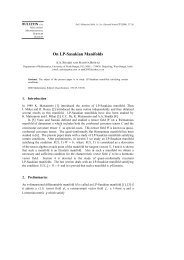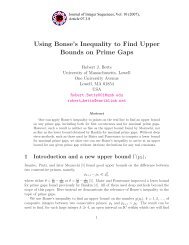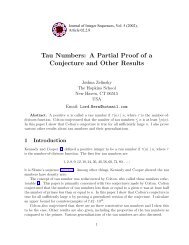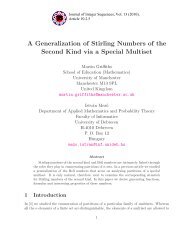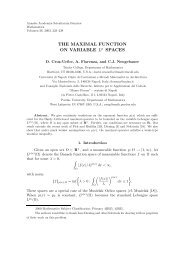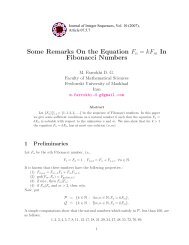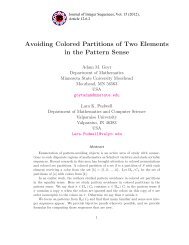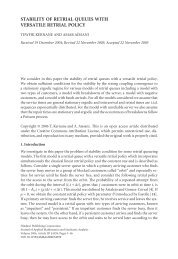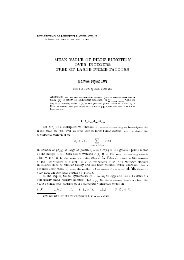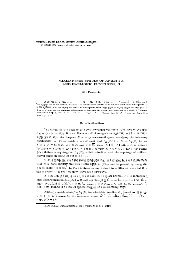(except the set of fixed points of f is well ordered) are satisfied and f has two fixed points 1 and3 in X. Note that (1, 3), (3, 1) ∉ ⊑ .On the other hand, for x = 1, y = 3, there is no λ such that 0 ≤ λ < 1 and d(fx, fy) ≼ λd(x, y).Therefore, f is not a Banach contraction on X.In the following theorem the conditions on f, “nondecreasing” and completeness of space, arereplaced by another condition.Theorem 2. Let (X, ⊑, d) be an ordered cone rectangular metric space and f : X → X be amapping. Suppose that following conditions hold:(I) f is an ordered Reich type contraction, i.e., it satisfies (3);(II) there exists u ∈ X such that u ⊑ fu and d(u, fu) ≼ d(x, fx) for all x ∈ X.Then f has a fixed point. Furthermore, the set of fixed points of f is well ordered if and only iffixed point of f is unique.◭◭ ◭ ◮ ◮◮Go backFull ScreenCloseQuitProof. Let F (x) = d(x, fx) for all x ∈ X and z = fu, then F (u) ≼ F (x) for all x ∈ X. IfF (u) = θ, then u is a fixed point of f. If θ ≺ F (u), then by assumption (II) u ⊑ fu, so u ⊑ z andby (I), we obtainF (z) = d(z, fz) = d(fu, fz)≼ λd(u, z) + µd(u, fu) + δd(z, fz)= λd(u, fu) + µd(u, fu) + δd(z, fz)= λF (u) + µF (u) + δF (z)F (z) ≼ λ + µ F (u) ≺ F (u) (as λ + µ + δ < 1),1 − δa contradiction. Therefore, we have F (u) = θ, i.e., fu = u. Thus, u is a fixed point of f.
The necessary and sufficient condition for uniqueness of fixed point follows from a similar processas used in Theorem 1.□◭◭ ◭ ◮ ◮◮Go backFull ScreenCloseQuit1. Abbas M. and Jungck G., Common fixed point results for non commuting mappings without continuity in Conemetric spaces, J. Math. Anal. Appl. 341 (2008), 416–420.2. Altun I. and Damnjanović B. and Djorić D., Fixed point and common fixed point theorems on ordered conemetric spaces, Appl. Math. Lett., (2009), doi:10.1016/j.aml.2009.09.016.3. Altun I. and Durmaz G., Some fixed point theorems on ordered cone metric spaces, Rend. Circ. Mat. Palermo,58 (2009), 319–325.4. Azam A. and Arshad M., Kannan fixed point theorem on generalized metric spaces, The Journal of NonlinearScience and its Applications, 1 (2008), 45–48.5. Azam A. and Arshad M. and Beg I., Banach contraction principle in cone rectangular metric spaces, Appl.Anal. Discrete Math., 3 (2009), 236–241.6. Di Bari C. and Vetro P., Weakly ϕ-pairs and common fixed points in cone metric spaces, Rend. Circ. Mat.Palermo, 58 (2009), 125–132.7. Branciari A., A fixed point theorem of Banach-Caccippoli type on a class of generalized metric spaces, Publ.Math. Debrecen, 57 (2000), 31–37.8. Deimling K., Nonlinear Functional Analysis, Springer-Verlag, 1985.9. Wei-Shih Du, A note on cone metric fixed point theory and its equivalence, Nonlinear Anal. 72 (2010), 2259–2261.10. Huang L. G. and Zhang X., Cone metric spaces and fixed point theorems of contractive mappings, J. Math.Anal. Appl. 332 (2007), 1468–1476.11. Ilic D. and Rakocevic V., Quasi-contraction on a cone metric space, Appl. Math. Lett. 22 (2009), 728–731.12. Janković S., Kadelburg Z. and Radenović S., On cone metric spaces: A survey, Nonlinear Anal. 74 (2011),2591–2601.13. Jungck G., Radenović S., Radojević S. and Rakočević V., Common fixed point theorems for weakly compatiblepairs on cone metric spaces, Fixed Point Theory Appl. 57 (2009), ID 643840, 13 pages



